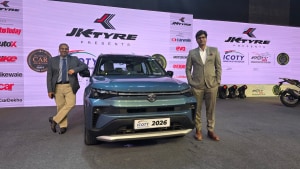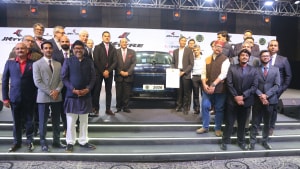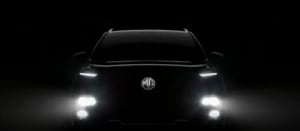Interview: Yoong S Kim, Head of Hyundai's eco-vehicles, on the Kona Electric's battery life, charging and range
Hyundai India has just introduced the Kona electric SUV to its consumers here. It's a very interesting proposition, which you can read here in a conversation that our editor, Bertrand D'Souza had with Yoong S Kim, who is the head of Hyundai's eco-tech vehicles.

Bertrand D'Souza: Mr Kim, thank you for being on the OD show, we have a set of few questions. EVs are an entirely new space in the Indian market. Hyundai is the first to come out with an electric SUV here. What are the challenges manufacturers face with EVs today, both in terms of technology and mindset?
Yoong S Kim: Depending on the core market, there is diversity among our global customers. We have to meet all these customers needs. We have prepared a lot of things to meet these needs. The most difficult thing is how we do this. For example driving range, we are preparing three different types of electric vehicles in the future. We've already launched a standard range electric vehicle with the Ioniq (300km), then there is the Kona long-range electric vehicle (500km) and in the future, we will launch a hi-performance long-range electric vehicle under the Genesis brand. With the three different types, we will meet the diverse needs of our global customers.
BD: So, for consumers today, what is the biggest mindset hurdle before them to accept EVs? Are they willingly and readily accepting electric vehicles?
YK: There are concerns about the driving range or the level of battery. They think, will the car start or not? This is a big hurdle to overcome such a concern.
BD: But today you have the long-range Kona electric here, and it's got 452km of range on a single charge. So the range factor shouldn't be a concern for consumers any longer.
YK: It depends on the customer's mindset. We thought this is the right solution for the Indian market. But after the feedback of Indian customers, we could introduce another EV like this, later.
BD: This comes with a smaller battery, from what I understand, 39.2kWh. There is a larger battery for the Kona EV available, does that mean that the range will extend considerably?
YK: Yeah this is a lithium-ion unit. In the global market, we have a 64kWh battery version as well. We call it a Long-Range electric vehicle there.
BD: You said there was a difference in the performance. You're looking at the performance aspect, long-range aspect and a standard EV as well. Does a larger battery mean you get more performance out of that as well?
YK: Considering just the range, the long range comes from the battery. In dynamic performance, they're almost the same. The difference is just the driving range.
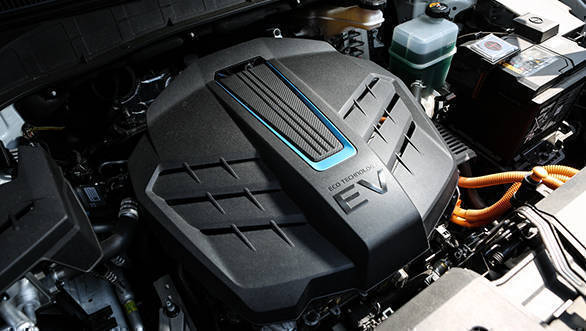 The Hyundai electric is on offer in two states of tune internationally - one is powered by a 39kWh battery pack while the other is more powerful and uses a 64kWh battery pack
The Hyundai electric is on offer in two states of tune internationally - one is powered by a 39kWh battery pack while the other is more powerful and uses a 64kWh battery pack
BD: With an EV, design and structural range is a very important aspect. You need to make it lighter, you need to keep it as strong, as secure and as safe for consumers as well. What are the kind of challenges in engineering you are facing with the design and manufacturing of EVs?
YK: This is an optimisation issue. Making an electric vehicle, like a conventional vehicle, is not difficult. But our challenge is how to optimise. Choosing the battery size considering driving range and money, and how to optimise the driving performance between weight and balance. This is our key challenge.
BD: Let's talk about the battery and electric motor for that matter. The battery especially, what's the kind of life-cycle we're looking at for the batteries that Hyundai is offering on the Kona?
YK: Technically we have battery durability under control, in India, we are offering an 8-year/1,60,000km warranty on the Kona Electric's battery.
BD: That is a huge amount of warranty. Battery life for that matter, what is that like?
YK: Longer than the warranty. Our warranty is 8-year/1,60,000km which means the battery life is longer than this duration. If it were less than this, we would have quite a few problems.
BD: The environment, India as you know it...yeah, we are sweating at the BIC, a hot day. But how does weather or temperature affect battery life or the range essentially?
YK: It's quite similar to a cell phone battery. Cold weather is bad for a battery inside an EV, but in India, it's hot and warm. It's a perfect place for electric vehicles, much like San Francisco in the US. Indian climate is a natural boon for electric vehicles.
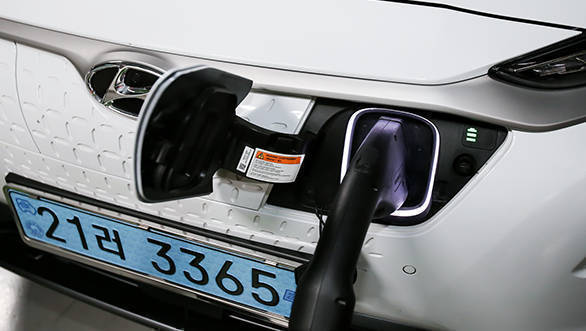 The charging port on the Hyundai Kona electric sits hidden under a flap on the front 'grille'
The charging port on the Hyundai Kona electric sits hidden under a flap on the front 'grille'
BD: Now on the battery charging aspect, you are offering a lot of options in this regard to consumers. There is a lot of back-end support that is going for consumers, the charging stations being set up. How easy is this whole infrastructure to be provided to consumers at the end of the day?
YK: Consumers get three different charging options. The first one is a fast charger, that will take less than one hour. The second one is a regular charger, this takes slightly more than six hours. At home, you can use an ITCB, which we offer with the Kona, for overnight charging.
BD: These are general questions that a lot of consumers, coming into this space, have in their mind. Does using the Kona's regular features like the AC, power windows, the infotainment system, derive power from the main battery? Or is there a supplementary battery?
YK: The power windows use a complementary 12V battery, while the AC uses a high-voltage battery.
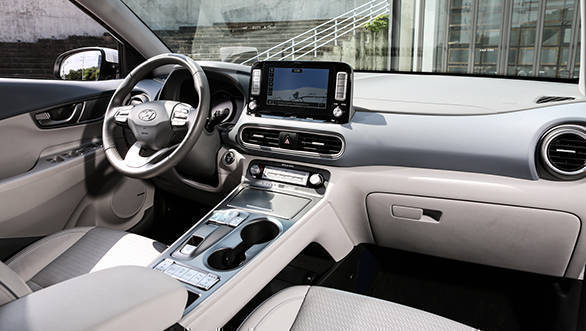
BD: The reason I asked this is that, again, we are a hot country, and the temperature conditions mean we will be using the AC very often. There's also a lot of pollution, like in the NCR, so people like to use the car's air filtration system. Hyundai is also well-known for the filtration system they provide in their cars. Does that affect battery life?
YK: We've already finished proving it in the global market, both in cold and hot places. So don't worry about AC or heating, we've sold over 45,000 units of the Kona Electric, globally, where the heating, ventilation and AC has been proven.
BD: Thank you, Mr Kim, that's all I have for you at the moment.
Also see: Hyundai Kona Electric First Drive Video
Starts Rs 23.72 Lakhs
-NA-
Automatic
136
395
-NA-
